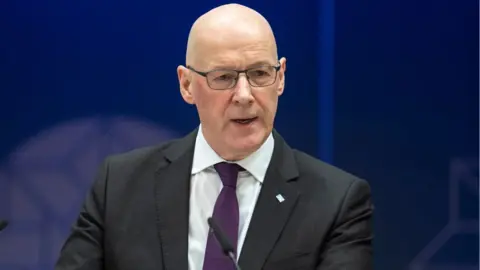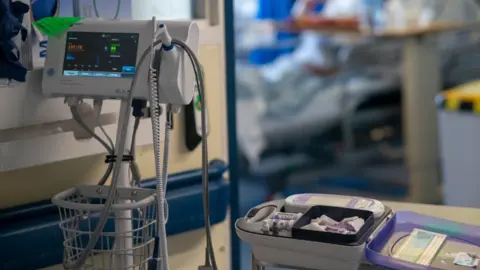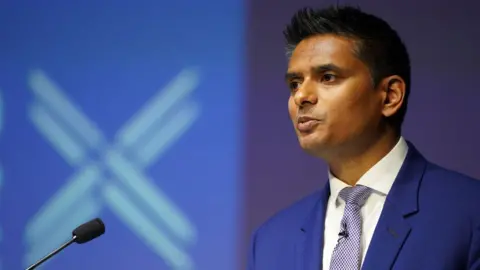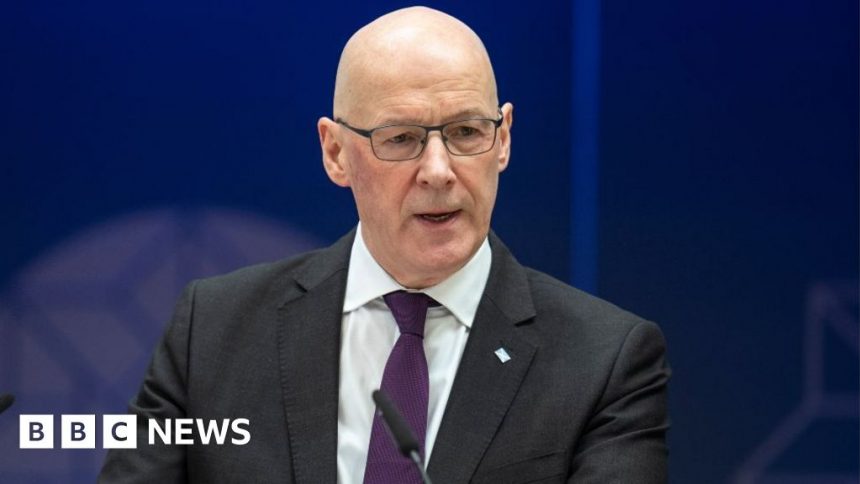Swinney announces plan to bring down NHS waits
 Getty Images
Getty ImagesNHS Scotland will deliver an extra 150,000 appointments and procedures in the coming year, First Minister John Swinney had pledged.
The SNP leader announced plans to bring down waiting lists, tackle delayed discharge and make it easier to get GP appointments.
He said the announcement “sets the NHS on a path of modernisation and renewal”.
Opposition leaders accused the SNP of mismanaging the NHS, which has recorded record waiting times and delayed discharge figures in recent months.
At a speech in Edinburgh, Swinney set out three priorities: to reduce immediate pressures in the NHS, shift the balance from acute services to the community and to use innovation to improve access to care.
He acknowledged patients were not getting “the right care in the right place at the right time”, warning that waiting times and delayed discharge figures were the “canary in the coal mine”.
The first minister said the extra 150,000 appointments and procedures would include 10,000 through “smarter working” at national treatment centres.
He said hospitals would do an extra 9,500 cataract procedures, as well as 2,500 extra orthopaedic appointments and procedures, such as hip or knee replacements.
 PA Media
PA Media“In this way, we will create centres of excellence, places of expertise and specialisation, where we will be better placed to capitalise on the technological innovation and the potential of AI,” the SNP leader told an audience at Herriot Watt University.
He vowed that ministers had listened to GPs and that a greater proportion of new NHS funding would go to primary and community care.
“As much as possible, people who do not need to be in hospital will not go to hospital, protecting those acute services for those who absolutely need them,” the first minister said.
He pledged £10.5m to improve GP capacity and “intervene earlier” in preventing illness.
Swinney told the audience that specialist “frailty” staff wold be stationed in accident and emergency departments from the summer.
“This will mean that frail patients, often older patients with complex needs, will bypass our busy A&Es, in order to receive the specialist care and support they need, whether in hospital or back at home,” he said.
The government’s Hospital at Home scheme is also to be expanded to at least 2,000 beds by the end of 2026.
“Without the need for any new bricks and mortar, the effective capacity of every single hospital in Scotland will be expanded,” the SNP leader said.
‘Smarter, better care’
Swinney said NHS Scotland’s Pharmacy First Service would be expanded “so that community pharmacies can treat a greater number of clinical conditions and prevent the need for a GP visit in the first place”.
He also vowed that better use of data would improve efficiency in operating theatres and cut waiting times, while innovations in genetic testing would be used to deliver “smarter, better care”.
And he said a digital dermatology service was being rolled out, while the NHS Digital Front Door app would be launched by the end of the year. The app will allow patients manage and contribute to their own health and care information online and interact with health and social care services.
The Scottish government has made a series of commitments to tackle NHS backlogs since the pandemic.
However, targets to “eradicate” long waits have been missed, with NHS waiting lists and delayed discharge figures hitting record highs.
Audit Scotland said last month that “difficult decisions” might have to be made about whether the NHS can continue to provide some services. It called for urgent reform to cope with growing demand.
The British Medical Association also warned the NHS would struggle to make it through another year without immediate action.
 PA Media
PA MediaScottish Conservative health spokesperson Sandesh Gulhane said: “After 18 years of SNP incompetence our NHS is in full-on crisis mode. Patients and staff deserve more than empty rhetoric, they need action.”
Scottish Labour accused the SNP of a series of failures, including wasted funding, workforce shortfalls and A&E waiting times.
Scottish Labour deputy leader Jackie Baillie said: “Under the SNP, nurses are treating patients in hospital corridors, ambulances are stuck outside A&E and social care is on its knees.”
Unison, which represents more than 60,000 NHS Scotland staff, called for action from to bolster the workforce.
The union’s co-lead for health Matt McLaughlin said: “The NHS has a staffing crisis. NHS workers need to know how the government will fill vacancies, improve pay, transform social care and give better patient care.”







